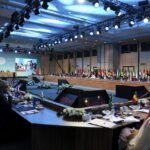Camp David, Mary Land, 18 Aug. 2023 (Yonhap)
Leaders of South Korea, the United States and Japan agreed Friday to significantly expand trilateral security cooperation, pledging to immediately consult one another in the event of common threats, hold annual joint military exercises and cooperate closely for stronger missile defense against North Korea.
The agreements were reached during a trilateral summit between South Korean President Yoon Suk Yeol, U.S. President Joe Biden and Japanese Prime Minister Fumio Kishida at the Camp David presidential retreat in Maryland, the first time the leaders of the three countries met for a standalone meeting and one that was hailed by Yoon as opening a new chapter in trilateral cooperation.
"Now, Camp David will be remembered as a historic place where South Korea, the United States and Japan declared their intention to promote the rules-based international order on the foundation of the common values of freedom, human rights and the rule of law, and to play a central role for regional security and prosperity," Yoon said in a joint press conference after the summit.
Biden touted the leaders as having 'made history', while Kishida said it was 'necessary' and a demand of the times to realize their potential for strategic cooperation.
The agreement to consult one another in the event of common threats, dubbed the "Commitment to Consult Among Japan, the Republic of Korea, and the United States," was a first among the three nations and elevated their partnership to a new level amid security and economic challenges posed by North Korea and China.
It underscored the urgency of jointly responding to common challenges, such as North Korea's nuclear threat and supply chain disruptions, after years of historical tensions between Seoul and Tokyo prevented deeper cooperation at the trilateral level.
The following is the full text of the 'Commitment to Consult' adopted by South Korean President Yoon Suk Yeol, U.S. President Joe Biden and Japanese Prime Minister Fumio Kishida at their trilateral summit at Camp David, Maryland, on Friday.
Commitment to Consult Among Japan, the Republic of Korea, and the United States.
We, the leaders of Japan, the Republic of Korea, and the United States, commit our governments to consult trilaterally with each other, in an expeditious manner, to coordinate our responses to regional challenges, provocations, and threats affecting our collective interests and security. Through these consultations, we intend to share information, align our messaging, and coordinate response actions.
Our countries retain the freedom to take all appropriate actions to uphold our security interests or sovereignty. This commitment does not supersede or otherwise infringe on the commitments arising from the Treaty of Mutual Cooperation and Security Between Japan and the United States and the Mutual Defense Treaty Between the United States and the Republic of Korea. This commitment is not intended to give rise to rights or obligations under international or domestic law.
The document did not specify the type of threat or challenge that will trigger the commitment to consult, but a South Korean presidential official cited examples such as trade disputes, a North Korean missile threat, a serious provocation at sea, or any threat in or outside the region.
Also, in the event one country decides not to share information because it deems a particular threat to not be a threat to itself, it will have no obligation to do so, the official said.
"Our countries retain the freedom to take all appropriate actions to uphold our security interests or sovereignty," the document read, noting the commitment would not supersede any obligations under the alliance treaties between South Korea and the U.S. or between the U.S. and Japan, or give rise to rights or obligations under international or domestic law.
the statement said.
Issues of economic security were also discussed in detail, with the three leaders committing to work closely to launch pilot programs for early warning systems about supply chain shortages. The three sides agreed to cooperate on supply chain resilience, especially on semiconductors and batteries; technology security and standards; as well as clean energy and energy security, among other areas.
They further agreed to strengthen cooperation to prevent their cutting-edge technologies from being illegally exported or stolen abroad.
A third document outlining the guiding principles for trilateral cooperation, called "Camp David Principles," was also adopted at the summit.
The principles provide the basis for the agreements in the Spirit of Camp David joint statement.
Thanking Biden at the press conference for his warm welcome, Yoon said he hopes to host the next trilateral meeting in South Korea.











